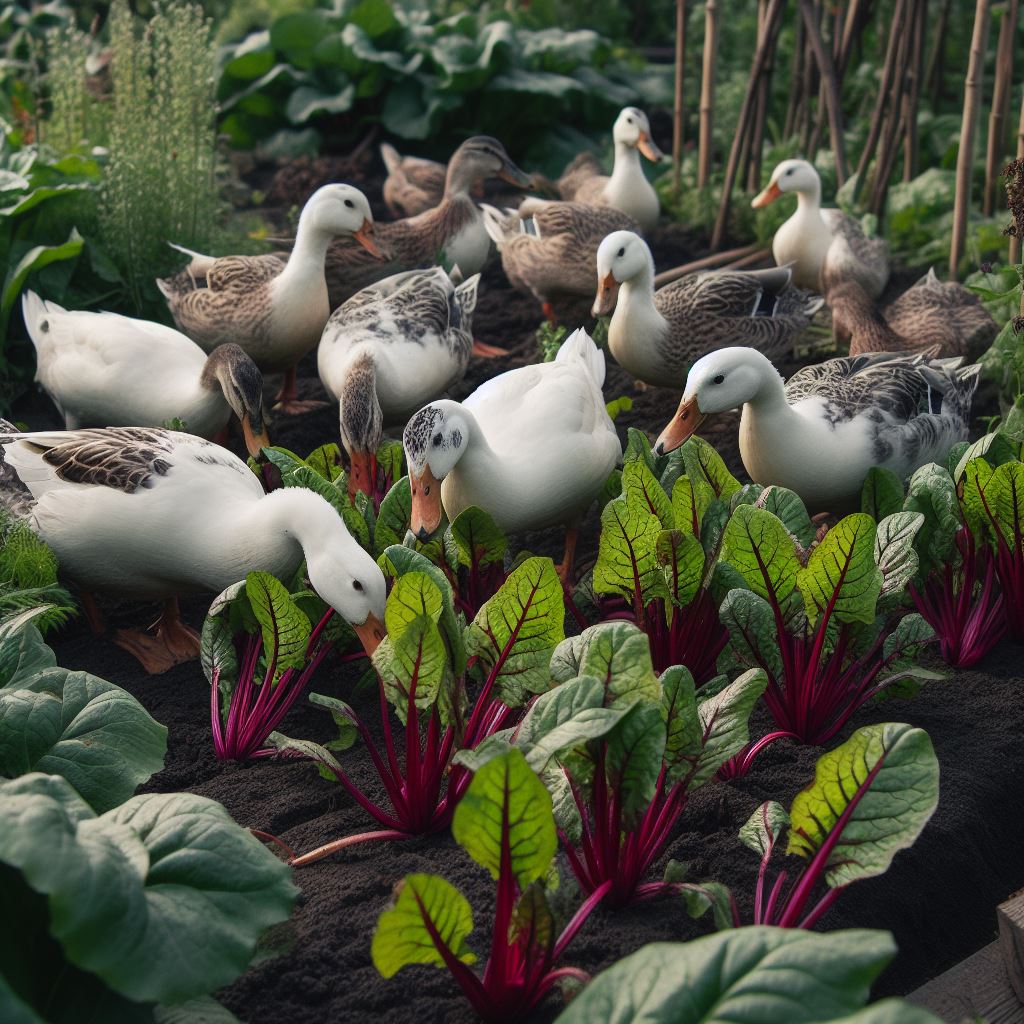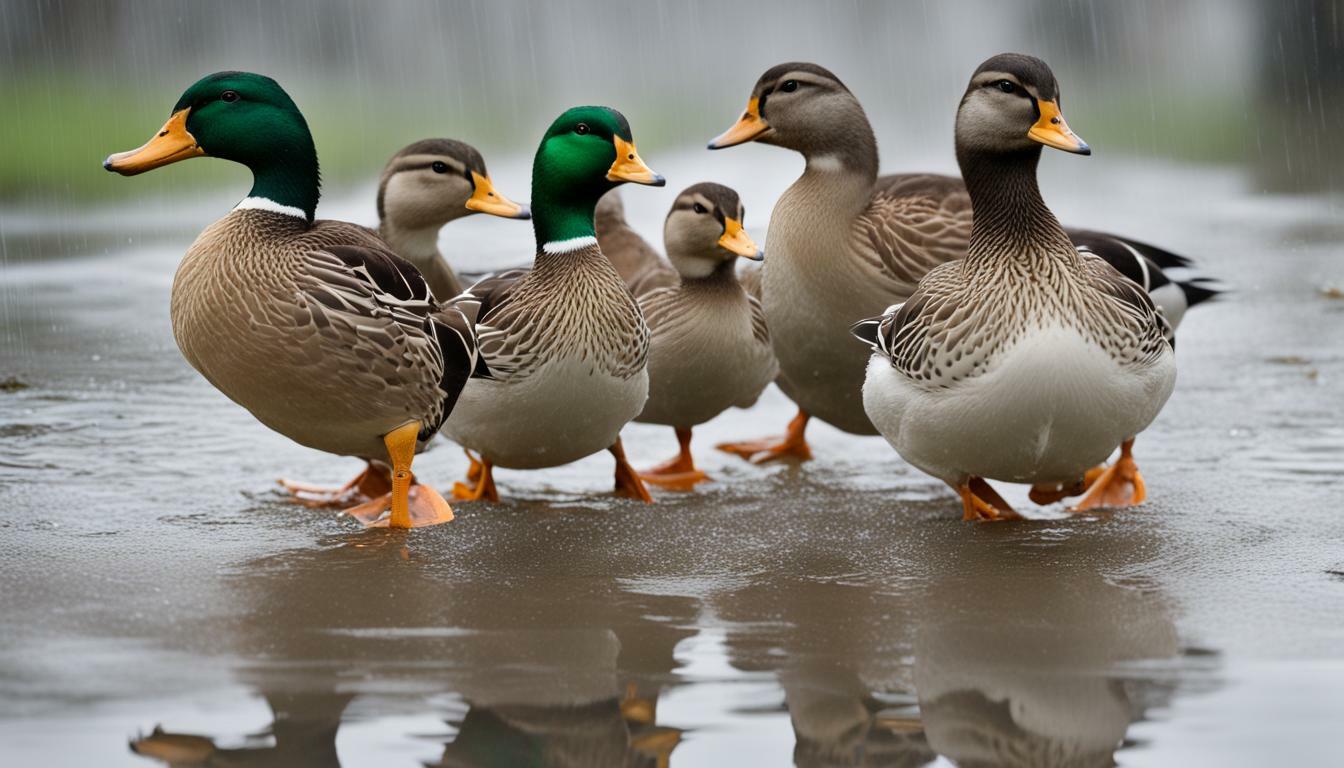Can Ducks Eat Barley? Here’s What You Need to Know
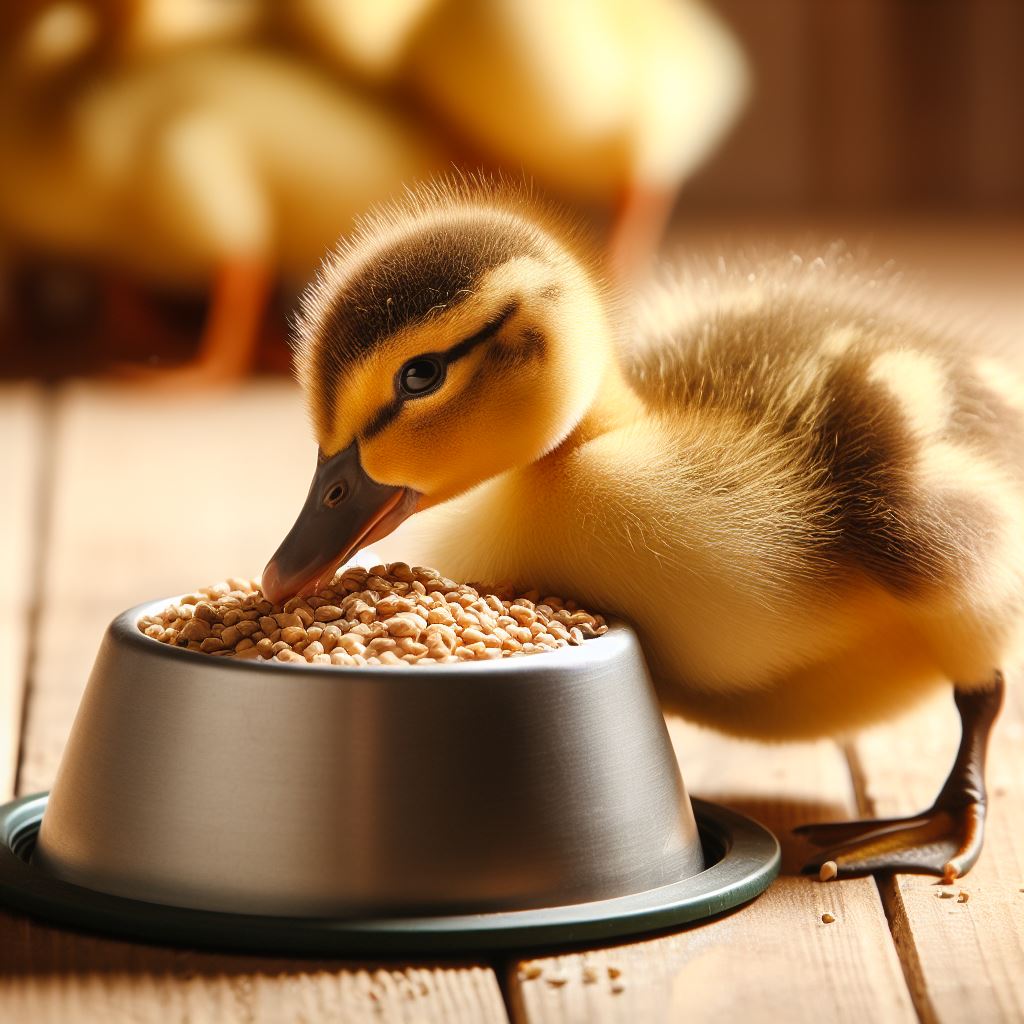
Table of content:
- What Exactly is Barley?
- The Nutritional Benefits of Barley for Ducks
- Is Barley Safe For Ducks to Eat?
- How to Introduce Barley to Your Ducks’ Diet
- How Much Barley is Toxic to Ducks?
- How to Prepare Barley for Ducks
- Mixing Barley With Other Feeds
- The Importance of Providing Ducks With Clean Water
- Frequently Asked Questions About Feeding Barley to Ducks
- Conclusion: Is Barley Good or Bad For Ducks?
Barley is a nutritious and affordable grain that makes a great addition to any duck’s diet. As a duck owner, you likely want to provide your feathered friends with treats that are not only tasty but also good for their health. But is barley safe for ducks to eat?
In this comprehensive guide, we’ll cover everything you need to know about feeding barley to ducks. We’ll discuss the nutritional benefits of barley, how to properly prepare and introduce barley to your duck’s diet, and any potential risks to be aware of.
What Exactly is Barley?
Before we dive into whether ducks can eat barley, let’s first understand what barley is.
Barley is a cereal grain that comes from the Hordeum vulgare or Hordeum distichum grass family. It is considered a whole grain and has been grown as a food source for humans and livestock for thousands of years.
Some key facts about barley:
- Barley grows in temperate climates and adapts well to different growing conditions. The barley plant has long stalks with grain spikelets that contain barley kernels or seeds.
- There are different types of barley including hulled barley, hulled barley, and pearl barley. Hulled barley has an inedible fiber hull around the kernel that needs to be removed. Hulless barley has a loose hull that naturally falls off during harvesting. Pearl barley is hulled barley that has been polished to remove the hull and bran layer.
- It has a mildly sweet, nutty flavor and a chewy consistency.
- Barley is high in fiber, manganese, selenium and contains some protein, B vitamins, iron, magnesium, zinc and copper.
- In addition to human consumption, barley is commonly used as animal feed and as an ingredient in beers and spirits.
Now that we understand the basics of what barley is, let’s look at the benefits it can provide ducks.
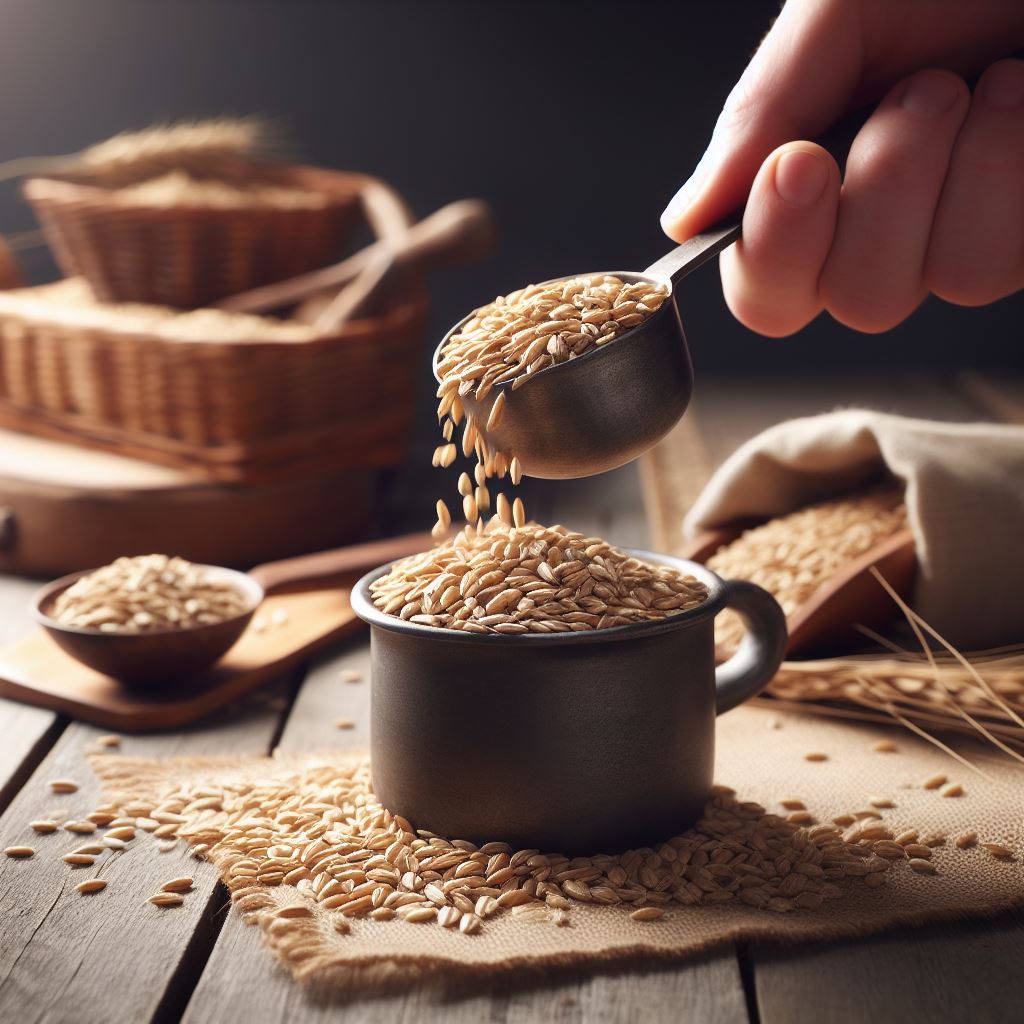 The Nutritional Benefits of Barley for Ducks
The Nutritional Benefits of Barley for Ducks
Barley can make an excellent addition to a duck’s diet because it provides important vitamins, minerals, and nutrients:
- Protein – Barley contains moderate amounts of protein, approximately 10-11%. Protein is essential for helping ducklings grow and develop muscles and tissues.
- Fiber – The indigestible parts of barley provide insoluble fiber that promotes digestive health. Fiber keeps the digestive system functioning properly.
- B Vitamins – Barley contains B vitamins like niacin, thiamin, and pyridoxine which help ducks convert food into energy and maintain proper nervous system functioning.
- Minerals – Barley provides minerals like iron, magnesium, selenium, and manganese which serve many important roles in bone health, enzyme production, muscle function, etc.
- Carbohydrates – Barley is an excellent source of complex carbohydrates for energy. Ducks use carbs to fuel activity, growth, and body processes.
- Beta-glucan – A type of soluble fiber found in barley that has antioxidant and immune boosting properties. This can support duck health.
Barley has a stellar nutritional profile that can supplement important vitamins, minerals, protein, fiber, carbohydrates, and antioxidants in a duck’s diet. This helps support digestion, energy, growth, development, and overall health.
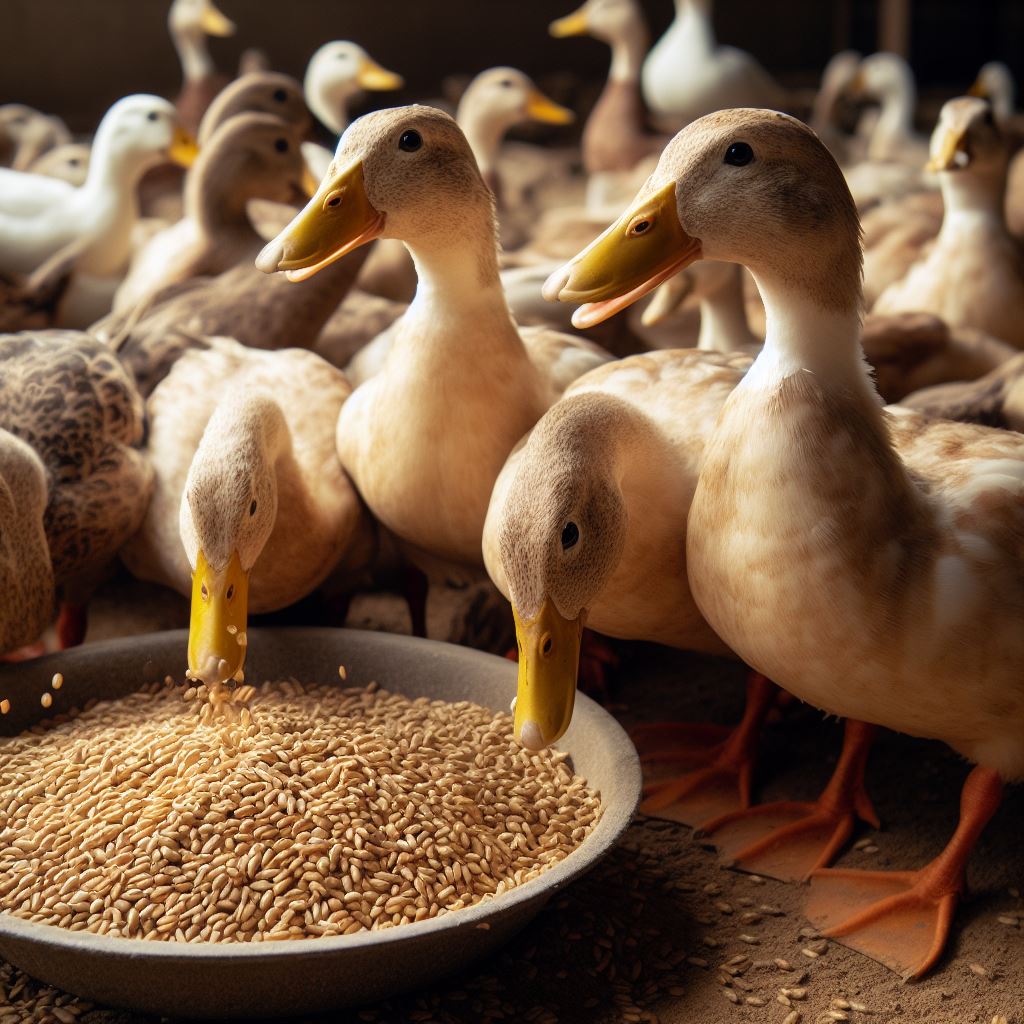 Is Barley Safe For Ducks to Eat?
Is Barley Safe For Ducks to Eat?
Now that we’ve covered the nutritional benefits of barley, the next question is: can ducks safely eat barley?
The answer is yes, ducks can safely eat barley in moderation. Barley does not contain any toxins that are hazardous to ducks. Many duck owners already incorporate some barley into their ducks’ meals or as an occasional treat.
However, there are some important considerations when feeding barley to ducks:
Amount to Feed
When introducing any new food, it’s best to start slowly. Feed barley to ducks in small amounts at first to allow their digestive system to adjust. Too much at once can cause diarrhea or upset stomach.
Once adapted, ducks can consume 1-2 oz of dry barley per day scattered in their feed or as a treat. Limit barley to 5-10% of their total daily diet. The remaining should come from their typical duck feed and natural grazings.
Risk of Mycotoxins
One potential risk with barley is mycotoxin contamination from mold growth. Mycotoxins are toxic substances that can cause sickness.
Ensure barley is properly stored, handled, and checked for visible mold. Discard any contaminated portions. Mycotoxins are more likely in hot, humid weather.
Choking Hazard
Since barley kernels are small and round, ducks need constant access to water. The kernels can swell when wet and may pose a choking risk if ducks do not have enough water to help swallow them.
So as long as barley is fed properly, in moderation, and ducks have sufficient drinking water, barley is safe for consumption. Continue reading for tips on introducing barley and preparing it for your flock.
How to Introduce Barley to Your Ducks’ Diet
When offering any new food, it’s important to slowly transition ducks to allow adaptation. Here are some tips for safely introducing barley:
- Start with a small amount – 1/8 cup per duck – and slowly increase over 2 weeks.
- Mix barley thoroughly into their normal feed so they cannot selectively eat only barley.
- Scatter dry barley in their pen or yard so ducks cannot gorge themselves.
- Ensure plenty of fresh, clean drinking water. Change the water at least twice a day.
- Watch for signs of digestive upset – decreased appetite, loose droppings, lethargy. Stop feeding barley if these occur and try again in smaller doses.
- Once adapted, feed barley just 1-2 times per week rather than daily. Variety is important!
By starting slow and mixing barley with regular feed, your ducks can safely adapt to eating this nutritious grain. Always keep an eye out to ensure normal eating, drinking, and droppings.
How Much Barley is Toxic to Ducks?
It’s understandable to be cautious about feeding a new treat to your ducks. So how much barley is actually toxic?
The good news is barley does not contain any inherent toxins that are poisonous to ducks like chocolate is to dogs, for example.
However, eating an excessive quantity of food can potentially cause health issues. According to research, the maximum tolerable level of barley for ducks is approximately 40% of their diet.
Feeding barley above this amount over a prolonged period may potentially cause:
- Digestive upset, diarrhea
- Dehydration if insufficient water
- Excessive weight gain
- Nutritional deficiencies if displacing other foods
- Increased risk if mycotoxins are present
The key is moderation. By sticking within 5-10% of total intake per day, barley is perfectly safe for ducks to consume. Monitor your ducks closely when introducing new treats and never allow gorging.
How to Prepare Barley for Ducks
Before you serve up barley for your ducks, keep these preparation tips in mind:
- Check for mold/fungus – Discard barley with any discoloration, odor or visible mold. Mycotoxins from mold can be dangerous.
- Clean/sift – Rinse and drain barley to remove debris. Sift to remove any small pebbles.
- Avoid added seasonings – Do not add any salt, butter, sugars, or other flavorings. Stick with plain barley.
- Soak and drain – Consider soaking barley in water for 8 hours which increases digestibility. Then drain fully before feeding.
- Cook lightly – For young ducklings, boil barley for 20 minutes to soften. Allow to cool before feeding.
- Grind coarsely – Use a food processor or grinder to break down barley into smaller pieces if needed for young ducks.
Proper storage and preparation allow you to tap into barley’s nutritional benefits while avoiding potential risks to your flock’s health and safety.
Mixing Barley With Other Feeds
Rather than offering barley on its own, it is best to mix it into a duck’s normal daily feed. This prevents selectively eating only barley.
Some healthy feeds that complement barley’s nutrients include:
- Duck feed/pellets – Formulated to provide balanced nutrition for ducks with vitamins, minerals, protein, etc.
- Oats – High in manganese, antioxidants, and fiber. Help grind barley in gizzard.
- Cracked corn – Provides carbohydrates for energy and supports digestion.
- Rice – Easily digested grain that is high in B vitamins.
- Wheat – Contains amino acids for growth and magnesium for bone health.
Rotate various grains and mixes to ensure your ducks get diverse nutrients in their diet. Barley makes a tasty and healthy addition to any balanced duck feed.
The Importance of Providing Ducks With Clean Water
Whenever feeding ducks dry grains like barley, it is essential they have unlimited access to fresh, clean drinking water.
Here’s why water is crucial:
- Prevents choking – Allows easy swallowing of dry grains like barley.
- Supports digestion – Water keeps the digestive tract moving. Lack of water can cause gut impactions.
- Aids nutrient absorption – Water helps absorb nutrients from food in the intestines.
- Flushes toxins – Water removes waste and keeps ducks hydrated.
- Regulates body temperature – Ducks use water to cool their bodies in warm weather.
Be sure to change drinking water at least 2-3 times per day. Scrub water containers to prevent mold, algae, and contamination. Provide plenty of space for all ducks to access water simultaneously. This ensures good health when providing treats like barley.
Frequently Asked Questions About Feeding Barley to Ducks
Can I feed barley to ducklings?
Yes, you can feed barley to ducklings over 3 weeks old. Soak or cook the barley for 20 minutes to soften it first. Then mix a small amount – around 1/8 cup per duckling daily – into their feed once adapted. Ensure they have constant access to fresh water.
Should I soak barley before feeding?
Soaking barley for 8 hours before feeding can increase digestibility, but is not mandatory. Simply mixing dry barley into feed is fine. Just be sure to limit intake and provide ample drinking water.
Is pearled barley better than whole barley?
Pearled barley has the outer bran layer removed. This lowers fiber content but may be easier to digest. Either pearled or whole barley is safe for ducks in moderation. Mix into feed and watch for any digestive issues.
Can too much barley impact egg-laying?
Overfeeding any grain can reduce egg production. Limit barley to the recommended 1-2 ounces per duck daily to avoid displacing other nutrition needed for quality eggs. Monitor egg quantity and quality as you introduce barley.
Can barley be sprouted for ducks?
Yes, sprouting barley increases some vitamins and makes the barley more digestible. Sprouted grains are safe for ducks as an occasional treat. Follow proper sprouting methods to avoid mold.
Conclusion: Is Barley Good or Bad For Ducks?
Barley offers nutritional benefits and is perfectly safe for ducks in moderation. Introduce slowly, limit to 5-10% of daily diet, feed mixed with other grains, and always provide unlimited drinking water. Follow these tips to tap into barley’s goodness while avoiding potential risks.
Always remember to introduce new foods slowly, provide unlimited fresh water, and monitor your ducks closely. Have fun expanding your feathered friends’ diet with nutritious variety! Be sure to share this guide with other duck owners who may be wondering if barley is good for ducks too.
Welcome. I’m Adreena Shanum, the proud owner of this website, and I am incredibly passionate about animals, especially poultry. I founded adreenapets.com as a labor of love, stemming from my desire to share my knowledge and experiences with poultry enthusiasts worldwide.


